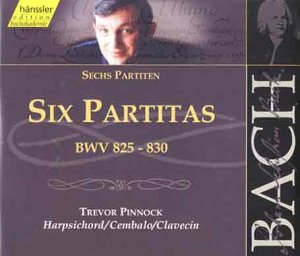Bach Partitas, BWV825-30
Pinnock makes a highly welcome return to recording, and steers with effortless command, innate musicianship and plenty of sparkle through at least one virtuoso minefield
View record and artist detailsRecord and Artist Details
Composer or Director: Johann Sebastian Bach
Genre:
Instrumental
Label: Hänssler
Magazine Review Date: 8/2000
Media Format: CD or Download
Media Runtime: 149
Mastering:
DDD
Catalogue Number: 92 115

Tracks:
| Composition | Artist Credit |
|---|---|
| (6) Partitas |
Johann Sebastian Bach, Composer
Johann Sebastian Bach, Composer Trevor Pinnock, Harpsichord |
Author: Lindsay Kemp
Hanssler’s eclectic approach to its ongoing complete Bach series is either one of its greatest strengths or one of its strongest irritations, depending on how you look at it. Is offering the English Suites on the piano and the Partitas on the harpsichord a commendably broad-church approach or just haphazard? The massive Bachakademie edition (of which this is Volume 115) is not a project noticeably concerned with period instruments, yet here they have persuaded Trevor Pinnock, founder of one of the world’s first and finest baroque orchestras, the English Concert, to return to the recording studio as a solo harpsichordist for the first time in many years.
Well bravo to them. The evidence of these discs is that Pinnock’s absence from the new release lists has been far too long. From the opening bars of the First Partita’s leisurely Praeludium, it is clear that this is a master harpsichordist, a player whose seemingly effortless command of his instrument allows him to express his innate musicianship without any need for overstatement or gratuitous point-making. There is nothing laboured or studied about his performances of these demanding works; his faultless finger technique allows him not only to step with confidence through a virtuoso minefield such as the Gigue of the Fifth Suite (his are the tightest trills I have heard), but perhaps, more important, to make a gently flowing legato the starting-point of his interpretation. It is an approach that could run the risk of being boring were it not that Pinnock’s ability to place every note precisely and sensitively – helped by an instrument (or is it the recording?) which takes the edge off each note’s attack – makes it come across as wonderfully natural and unaffected. Bach, after all, can do the rest.
Tempos, too, have a sense of rightness about them; the slightly excitable Pinnock of old has now become a fine and subtle judge of forward motion, shown to greatest advantage perhaps in his perfect reading of the giant Allemande from the Fourth Partita, a piece so hard to steer between the hasty and the leaden. And he can sparkle when he needs to; try out the fizzing Corrente of the Sixth Partita.
These are performances of enormous distinction, then, and it is a pleasure to welcome Pinnock back after such an absence. Let’s hope that he will soon catch up lost ground and record more of his instrument’s mainstream repertoire.'
Well bravo to them. The evidence of these discs is that Pinnock’s absence from the new release lists has been far too long. From the opening bars of the First Partita’s leisurely Praeludium, it is clear that this is a master harpsichordist, a player whose seemingly effortless command of his instrument allows him to express his innate musicianship without any need for overstatement or gratuitous point-making. There is nothing laboured or studied about his performances of these demanding works; his faultless finger technique allows him not only to step with confidence through a virtuoso minefield such as the Gigue of the Fifth Suite (his are the tightest trills I have heard), but perhaps, more important, to make a gently flowing legato the starting-point of his interpretation. It is an approach that could run the risk of being boring were it not that Pinnock’s ability to place every note precisely and sensitively – helped by an instrument (or is it the recording?) which takes the edge off each note’s attack – makes it come across as wonderfully natural and unaffected. Bach, after all, can do the rest.
Tempos, too, have a sense of rightness about them; the slightly excitable Pinnock of old has now become a fine and subtle judge of forward motion, shown to greatest advantage perhaps in his perfect reading of the giant Allemande from the Fourth Partita, a piece so hard to steer between the hasty and the leaden. And he can sparkle when he needs to; try out the fizzing Corrente of the Sixth Partita.
These are performances of enormous distinction, then, and it is a pleasure to welcome Pinnock back after such an absence. Let’s hope that he will soon catch up lost ground and record more of his instrument’s mainstream repertoire.'
Discover the world's largest classical music catalogue with Presto Music.

Gramophone Digital Club
- Digital Edition
- Digital Archive
- Reviews Database
- Full website access
From £8.75 / month
Subscribe
Gramophone Full Club
- Print Edition
- Digital Edition
- Digital Archive
- Reviews Database
- Full website access
From £11.00 / month
Subscribe
If you are a library, university or other organisation that would be interested in an institutional subscription to Gramophone please click here for further information.




